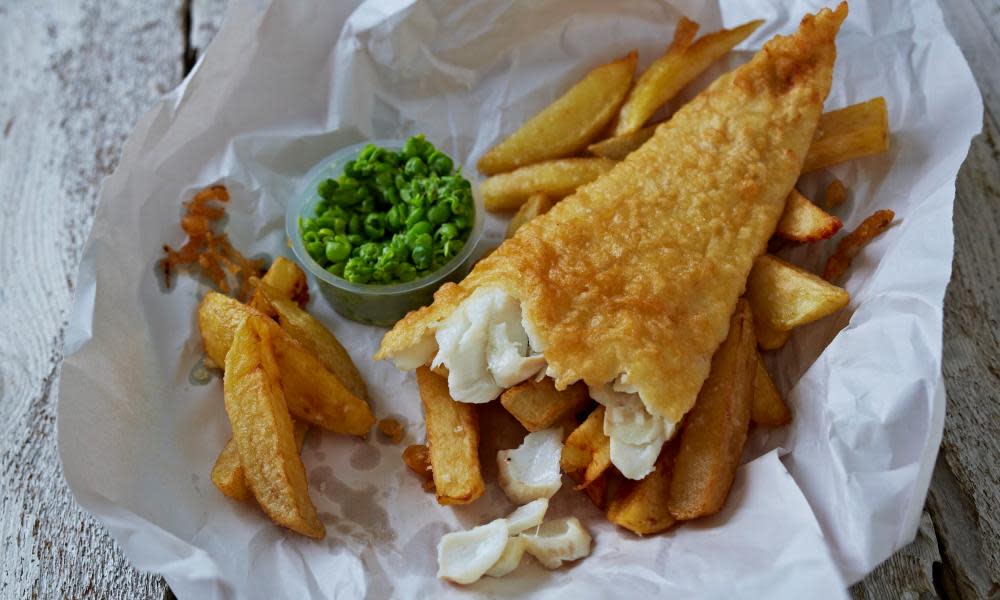It’s fish and chips night – but can we eat cod with a clear conscience? | Callum Roberts

News that North Sea cod has made a comeback has been welcomed by fishermen, environmentalists and fish and chip lovers. After decades of overfishing, cod reached its nadir in 2006. By then, stocks were less than a fifth of levels seen in the early 1970s, and only a third of the size needed for long-term sustainability. This year stocks finally climbed back above the threshold for maximum sustainable yield, which means cod should be back on the menu for good.
The comeback has been bought at the price of long-term restraint in catches, and an innovative partnership between fishermen and managers. Landings today are less than an eighth of their 1970s peak, while fishermen have introduced measures like temporary closures to protect places with high bycatch of under-sized fish. Those with long experience in the industry say they haven’t seen as many cod, or such big fish, for 40 years. Their efforts have been rewarded with the Marine Stewardship Council’s blue tick for sustainability. So can we now eat cod with a clear conscience? Not quite.
The problem with many fishing methods is that they cause significant collateral damage in their pursuit of the target fish. Bottom trawling, the method used to catch North Sea cod, has come in for particular criticism. Heavy trawl nets dragged across the seabed catch a wide variety of species as well as cod. They also damage and destroy sensitive seabed life, such as sponges, corals and hydroids. When oil companies discovered cold-water coral reefs in the North Sea in the 1980s, half of them had already been turned to rubble by the long-term impacts of trawling.
Cod are well suited to intensive fishing. They are generalist predators that thrive even in places regularly hit by trawls, growing quickly and reproducing prolifically at a young age. But some of the species that live alongside them are not so fortunate. Two hundred years of intensive trawling have depleted many, like the common skate. This fish was a mainstay of early 19th-century trawl catches, and huge skate the size of dinner tables covered the floors of fish markets up and down the country. Today they have all but disappeared.
Incredibly, nearly all the English marine protected areas still allow bottom trawling and dredging for scallops
In the middle of the North Sea there is a low hill, the Dogger Bank, long renowned for its enormous productivity. In 1840, a single sailing boat could catch a ton of halibut a day. Left to itself, this flatfish can reach sizes of more than two metres long and hundreds of kg in weight. Today, the entire fishing fleet catches just two tonnes of halibut per year from the Dogger, a decline equivalent to the loss of more than 99% of the fish.
So while we celebrate cod’s renaissance, let’s not forget that we are still a long way from good management of UK waters. That will only be achieved with greater protection in addition to responsible fisheries. In the last seven years, the UK has established more than 80 marine protected areas. But they will only work if they are well-protected from fishing. Incredibly, nearly all the English marine protected areas still allow bottom trawling and dredging for scallops, both of which are incompatible with conservation. The Marine Stewardship Council is supposed to take environmental impacts into account in certifying good fisheries, but their environmental criteria are widely ignored in assessments. The blue tick should mean we can eat fish with a clear conscience, but it doesn’t.
The sea does so much more than feed us. Healthy ocean ecosystems are vital to keep waters clear and clean, protect coasts, and lock away carbon from greenhouse gas emissions. While fisheries dominate the agenda, these values are often ignored. But they shouldn’t be taken for granted. In many parts of the world, like the Baltic Sea, China and Mediterranean, serious problems have emerged as a result of a cocktail of over-fishing, overuse and pollution. To achieve the right balance, we need to fish less using less destructive methods, waste less, pollute less and protect more. The cod comeback is a great start, but we’re not there yet.

 Yahoo News
Yahoo News 
